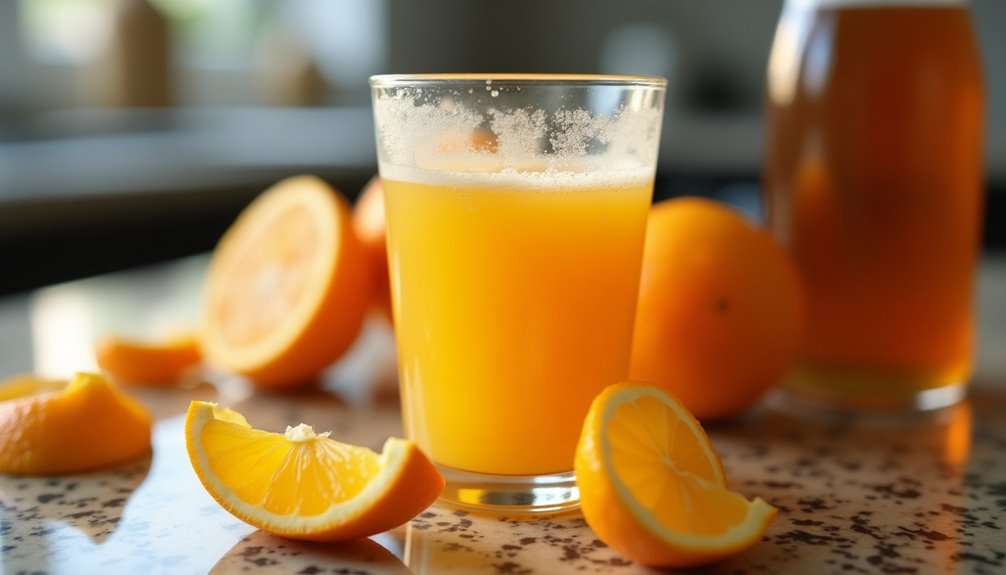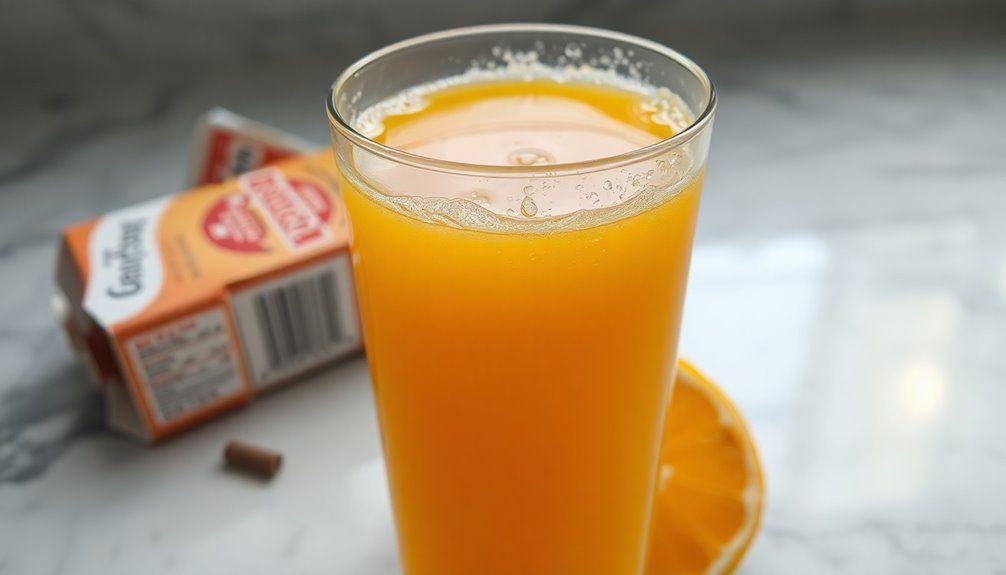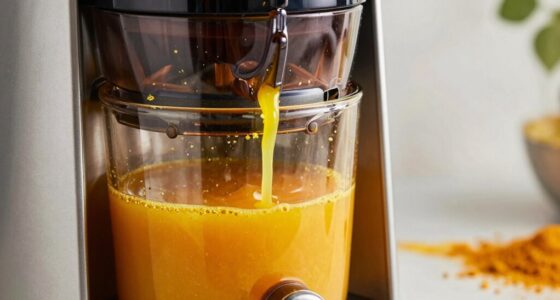To know if your orange juice is bad, start by inspecting its appearance for mold, lumps, or unusual colors. Next, give it a good sniff; if it smells rancid or vinegar-like, it's time to toss it. A taste test can also help—if it's bitter or off, don't drink it. Check the container for bulging, and always pay attention to expiration dates. Curious to learn more tips on ensuring your juice stays fresh?
Key Takeaways
- Inspect the juice visually for mold, lumps, or unusual colors like brown or gray, indicating spoilage.
- Smell the juice for a bright citrus scent; a vinegar-like odor signals it has gone bad.
- Taste a small amount; an off or bitter flavor means the juice is no longer safe to drink.
- Check the container for bulging or swelling, which may indicate fermentation and spoilage.
- Always verify the expiration date; discard juice past its "best used by" date for safety.

How can you tell if your orange juice has gone bad? It’s essential to be vigilant about the signs of spoilage to avoid drinking something that could make you sick. Look for changes in color, as fresh orange juice should have a vibrant, bright orange hue. Additionally, a sour smell or an off-taste can indicate that the juice has gone bad. Knowing how to identify spoiled orange juice can save you from consuming a product that could potentially lead to foodborne illness. Always check the expiration date and store it properly to extend its freshness.
Start by pouring your squeezed orange juice into a transparent glass. This simple step lets you inspect it more closely for visible signs of spoilage. Look for any mold, lumps, or unusual masses floating in the juice. If you notice anything odd, it's best to discard it.
Next, trust your senses, particularly your sense of smell. Take a moment to breathe in the aroma of the juice. Fresh orange juice should have a bright and citrusy scent. If you detect a rancid or vinegar-like odor, that's a clear indicator that the juice has gone bad. You definitely don't want to consume anything that smells off, as this could mean harmful bacteria have taken hold.
Color is another critical factor in determining whether your orange juice is still good. Fresh squeezed orange juice typically has a vibrant, sunny hue. If you observe significant darkening or any unusual colors, such as brown or grayish tones, it could be a sign of spoilage. The juice might also develop a cloudy appearance, which can indicate that it's no longer fresh. Always take a moment to assess the color before taking a sip.
Now, let's talk about taste. Even if the juice looks and smells fine, it's wise to taste a small amount. If the flavor is off, bitter, or just doesn't seem right, it's a strong indication that your orange juice has gone bad. Trust your palate; if it doesn't taste fresh and zesty, it's better to play it safe and throw it away.
Don't forget about container inspection, especially if you're working with store-bought orange juice. Check for any bulging or swelling in the container. If you see this, it could mean fermentation has occurred, which is a sure sign of spoilage. A well-sealed container should hold its shape, so any abnormalities are a red flag.
Finally, remember that orange juice is best used within a certain timeframe after opening. Whether it's freshly squeezed or store-bought, always pay attention to the expiration date or "best used by" date on the label. Even if the juice seems okay, it's not worth taking chances with your health.
Frequently Asked Questions
How Can You Tell if Orange Juice Has Gone Bad?
To tell if orange juice has gone bad, start by pouring it into a clear glass and checking for mold or unusual masses.
Smell the juice; if it has a rancid or vinegar-like odor, it's likely spoiled.
Observe the color for any significant darkening or odd hues.
Finally, taste a small sip—if it tastes off, it's best to toss it.
Also, watch for any swelling in the container, indicating possible fermentation.
What Happens if I Drink Bad Orange Juice?
What could possibly go wrong if you drink bad orange juice? You might experience nausea, vomiting, or diarrhea, all thanks to harmful bacteria like Salmonella or E. coli.
Spoiled juice can lead to abdominal cramps and even dehydration in severe cases. If you notice a foul odor or unusual texture, it's best to avoid taking that sip.
Your health's not worth the risk, especially for vulnerable groups like kids and the elderly.
How Long Does Orange Juice Last in the Fridge?
Orange juice typically lasts about 7 to 10 days in the fridge once opened.
If you've freshly squeezed it, aim to drink it within 2 to 3 days for the best taste.
Commercially packaged juice can last up to 1.5 weeks if kept sealed and refrigerated.
Always check the "best by" date on the carton before you open it, as it helps ensure you're enjoying the juice at its freshest.
What Are the Signs of Bad Juice?
Did you know that about 20% of fruit juices end up being discarded due to spoilage?
When you're checking juice for signs of spoilage, look for a foul smell, visible mold, or unusual cloudiness.
If the color has darkened or faded significantly, it's a red flag.
Lastly, trust your taste; if the juice has an off or rancid flavor, it's best to toss it out to avoid any health risks.
Conclusion
In conclusion, keeping an eye on your orange juice is key to enjoying its fresh taste. Trust your senses—if it smells off, looks cloudy, or tastes sour, it’s time to say goodbye. Just like a ripe orange, good juice should bring a burst of sunshine to your day. Remember, when in doubt, throw it out! After all, your health is worth its weight in gold, so don’t take chances with spoiled juice. Additionally, understanding how Tropicana produces low acid juice can enhance your experience, as it appeals to those who prefer a smoother taste while still enjoying the same refreshing flavor. By utilizing a unique process that reduces the acidity, Tropicana ensures that you can savor every sip without discomfort. So, the next time you reach for a glass of orange juice, remember to check its quality and appreciate the care behind its production.
Cindy thoroughly researches juicing trends, techniques, and recipes to provide readers with practical advice and inspiration. Her writing style is accessible, engaging, and designed to make complex concepts easy to understand. Cindy’s dedication to promoting the advantages of juicing shines through her work, empowering readers to make positive changes in their lives through the simple act of juicing.











